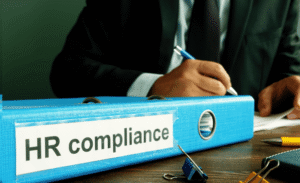Traditional performance reviews are cumbersome and only held once or twice a year. In today’s dynamic work environment, performance reviews should support employee growth, engagement, and performance. Performance reviews should explore employee development, expectations, and future growth opportunities, not criticism or judgment. When conducted with the right mindset and strategy, performance reviews can improve employee-manager relationships and align individual efforts with company goals.
Create a Culture of Continuous Feedback
Moving from annual performance reviews to continuous feedback is an important change in an effective performance review process. Regular feedback eliminates surprises in formal conversations and allows employees to understand their strengths and weaknesses throughout the year. This ongoing communication builds trust, encourages employees to adapt on the fly, and allows employees to improve without the need for an annual meeting. HR teams can encourage managers to incorporate feedback into daily communications for more open, constructive, and timely communication that promotes employee growth and performance.
Have Clear and Aligned Goals
Effective performance reviews should have clear, measurable goals that support the organization’s objectives. When employees understand how their work helps the organization, they are more motivated and focused. HR teams should set clear, achievable goals that are reviewed regularly. Setting performance review goals can make reviews more objective and actionable. Clear goals help employees stay focused, engaged, and perform better, which can improve performance and job satisfaction.
Foster Two-Way Conversation
Performance reviews should be a two-way conversation, not a top-down one. It is essential to listen to employees’ perspectives, challenges, and goals. Joint reviews engage and respect employees, which improves performance. HR should teach managers to listen, ask open questions, and accept feedback. This promotes honesty, reduces anxiety, and builds respect. Two-way conversations can increase clarity, understanding, and accountability for growth and development goals.
Effective Training for Evaluation Managers
Well-trained supervisors are essential for performance reviews. Many managers are promoted for their technical skills but lack the interpersonal and communication skills needed to conduct effective evaluations. HR should train managers on how to give feedback, handle difficult conversations, and set goals. Help them avoid common mistakes such as focusing on the negative, being vague, or allowing personal biases to influence evaluations. Confident and well-prepared managers are more likely to conduct fair, effective, and developmental evaluations.
Forward-Looking, Developmental Evaluations
While past performance is critical, effective performance reviews should focus on the future. Employees want to understand how they can grow, what development opportunities exist, and what support is available. HR should emphasize development during performance reviews, including discussions about career goals, skill gaps, and learning opportunities. Forward-looking evaluations motivate employees and demonstrate the company’s commitment to their success. When employees see a path to advancement and personal development, they are more engaged and loyal.
Support Performance Conversations with Data
Honest performance reviews require objective data. Recalls and subjective opinions can lead to bias and inconsistencies. HR should help establish systems to track project results, customer feedback, peer reviews, and performance metrics throughout the year. This data helps ensure that evaluations are based on facts rather than assumptions and better reflect employee contributions. When evaluations are based on objective evidence, employees are more likely to accept and take feedback seriously, leading to better results.
Customizing the Process for Individual Needs
Every employee has a different personality, work style, and career aspirations. A universal review method is unlikely to be effective. HR teams need to develop adaptive review methods based on individual and departmental needs. Customizations can include the frequency, format, and focus of the review. Some employees prefer written feedback, while others prefer in-person interaction. A personalized review experience shows that the company values each employee, which helps build trust and fosters deeper engagement.
Include Peer and Self-Reviews
Incorporating peer and self-reviews into review conversations can broaden the conversation and provide more feedback. Employee self-reviews can increase self-awareness and accountability by reflecting on successes and challenges. Feedback from peers can provide new perspectives and highlight contributions that managers may overlook. HR teams can help structure effective and appropriate additional input. When used correctly, these elements can provide insights, reduce bias, and provide a more complete picture of employee performance.
Performance Appraisal and Rewards
Recognition and rewards are essential to performance management. Recognition for hard work and achievements improves employee morale and behavior. Performance evaluations should be closely aligned with the company’s reward system to recognize and reward employees for their excellent work. Rewards can include bonuses, promotions, or non-monetary recognition. HR staff must ensure that this connection is clear and consistent so that employees know their efforts are being recognized. Fair performance rewards motivate employees, build trust in the evaluation process, and inspire them to excel.
Maintain Consistency and Fairness within the Team
HR departments sometimes struggle to ensure consistency and fairness in performance evaluations across teams and managers. Evaluation discrepancies lead to dissatisfaction, distrust, and decreased employee engagement. HR departments must prevent such issues by establishing clear guidelines, evaluation systems, and calibration meetings so that management can discuss and adjust performance expectations. Regular evaluations and feedback on the evaluation process can identify and correct errors. Honesty, transparency, and employee trust in the evaluation process can promote fairness and accountability.
Conclusion
When done well, performance reviews can improve individual and organizational performance. In addition to assessing past performance, performance reviews build relationships, set expectations, and support continuous improvement. HR teams can transform performance reviews into meaningful conversations that foster employee growth and engagement by taking a proactive, data-driven, and employee-focused approach. Open communication, management training, and honesty are essential. When done well, performance reviews can be an enjoyable and rewarding experience for employees.
FAQs
Could you please explain why traditional performance reviews often do not achieve their intended success?
Traditional performance reviews fail because they focus primarily on past performance, are infrequent, lack transparency, and are one-sided, leaving employees feeling judged rather than supported.
How often should performance reviews be conducted?
To maintain performance and encourage continuous improvement, feedback should be provided weekly or quarterly. Formal reviews can be conducted annually or semi-annually.
What makes a satisfactory performance review?
A clear, honest, constructive, and collaborative review is effective. It encourages open communication, realistic goals, and future improvement beyond past performance.
Should employees review their performance?
Self-evaluations help employees reflect on their work, take responsibility for their growth, and facilitate honest and engaging performance reviews.
What role does HR play in performance reviews?
HR is responsible for designing the performance review system, training managers, ensuring fairness and consistency, providing tools and data, and aligning it with business goals and employee development.




